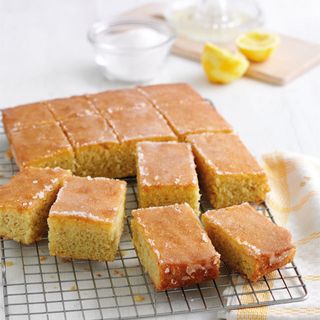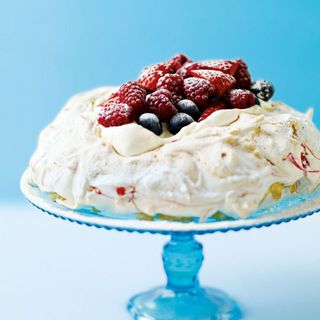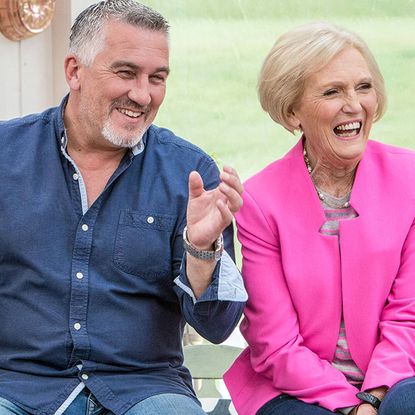Mary Berry and Paul Hollwood are back this August with more of our favourite TV show - Great British Bake Off! After 6 series, we've learned a lot from the queen of baking and Mr Hollywood, so we've rounded up 9 top tips we've picked up along the way and that every baker needs to know!
1. Use caster sugar rather than granulated sugar
Caster sugar has smaller particle sizes, giving you a lighter bake without the crystals that sometimes still remain when baking with granulated sugar. The finer crystals in caster sugar dissolve much easier which leaves you with a smoother, lighter and more airy bake!

For a really light sponge, try this Mary Berry lemon drizzle traybake. It's really delicate and so easy to make!
2. Whatever you do, DON'T open the oven door too soon
The quickest way to ruin your cake is by opening the oven before your cake is done. 'Sunken sponges are the result of under baking' Paul has previously told Woman's Weekly. Don't be tempted to check on it - as long as the oven's at the right temperature and you've followed the recipe properly, your cake will be fine! We know it's hard, but it's not worth the sad, sunken cake that'll have to go in the bin.
3. Use the exact amount of rising agent
Don't make the mistake of guessing the quantities of baking powder or bicarbonate of soda needed. One teaspoon can be the difference between a nice light, fluffy cake, or a flat, stodgey bake. Also, don't be over-enthusiastic with your mixing - we know it's fun, but you don't want to end up beating all the air out of your mixture - baking's a tricky game...
4. Get to know your oven
Everyone's oven is different, so as much as you might follow the instructions in a recipe to a T, you still need to use a bit of common sense. For example, if your oven has a hotspot, avoid it so your cake doesn't bake too quickly on the outside. Use your senses - if your cake is still too pale, without that nice golden colour, and it's not springy to the touch, then it's probably not done yet, so leave it in a little longer.
'If you've had your oven for many years get it serviced and check the efficiency of the oven thermometer' Paul told Woman's Weekly in a recent interview.
Recipes are great at the measuring stage and for how to mix the ingredients, but be smart when it comes to the actual baking stage. A cake cooked at a slightly lower temperature will also have a flatter top, avoiding a peaked and broken middle, as the mixture will rise more slowly and evenly.
5. Practice makes perfect when it comes to meringues
Unfortunately, the margin of error when it comes to meringues is quite wide. One of the most common problems people find is that their meringues start weeping during the baking process. The reason for this could be that you've 'added the sugar too quickly or you've added too much at once' Mary writes on her website. The key here is to take your time with the meringue and don't rush it.

If you want to give it a go, we've got plenty of recipes in our meringue recipes collection for you to try today.
6. Don't be a martyr
If you can do a job using a hand whisk or a kitchen aid, use them! You don't need to spend ages doing something by hand when you can easily use some handy kitchen equipment to help you. 'If a processor creates a better finished product than doing things by hand and saves you time and effort in the process, then I say go for it' Mary says. Take her advice - baking should be fun, and you should enjoy it!
Luba worked at woman&home between 2014-2017, specializing in food writing and styling. Starting out as a content writer, Luba moved up the ranks to become assistant digital food editor, bringing a creative approach to woman&home recipes. As well as heading up food content during her time at woman&home, Luba also worked on general lifestyle content.
-
 Chocolate and hazelnut roulade
Chocolate and hazelnut rouladeThis chocolate and hazelnut roulade comes with an optional Baileys Irish cream liqueur filling for an extra, festive twist
By Jen Bedloe Published
-
 Baileys Cheesecake
Baileys CheesecakeThis no-bake Baileys cheesecake is so easy to make and perfect for cream liqueur lovers, plus it takes just 40 minutes to prepare
By Jess Meyer Published
-
 Chocolate torte with Baileys cream and salted praline
Chocolate torte with Baileys cream and salted pralineServe this rich Chocolate torte with Baileys cream and salted praline for a festive dessert that makes a popular alternative to Christmas pudding
By Jen Bedloe Published
-
 Chocolate and hazelnut roulade
Chocolate and hazelnut rouladeThis chocolate and hazelnut roulade comes with an optional Baileys Irish cream liqueur filling for an extra, festive twist
By Jen Bedloe Published
-
 Baileys Cheesecake
Baileys CheesecakeThis no-bake Baileys cheesecake is so easy to make and perfect for cream liqueur lovers, plus it takes just 40 minutes to prepare
By Jess Meyer Published
-
 Chocolate torte with Baileys cream and salted praline
Chocolate torte with Baileys cream and salted pralineServe this rich Chocolate torte with Baileys cream and salted praline for a festive dessert that makes a popular alternative to Christmas pudding
By Jen Bedloe Published
-
 King Charles will return to work next week – official announcement accompanied by a touching new photo of His Majesty with Queen Camilla
King Charles will return to work next week – official announcement accompanied by a touching new photo of His Majesty with Queen CamillaThe King will return to work next week, accompanied by Queen Camilla to his first public-facing engagement in three months
By Kerrie Hughes Published
-
 Claudia Winkleman's Max Mara-style coat on The Piano has got us thinking about next winter before summer's even happened
Claudia Winkleman's Max Mara-style coat on The Piano has got us thinking about next winter before summer's even happenedWe've fallen in love with Claudia Winkleman's Max Mara-style coat from The Piano season 2 trailer
By Emma Shacklock Published
-
 Kate Middleton's contradictory pizza choice won't be everyone's go-to but it sounds mouth-watering
Kate Middleton's contradictory pizza choice won't be everyone's go-to but it sounds mouth-wateringThe Princess's surprising pizza topping of choice is quite unusual and it directly goes against one of her other mealtime preferences
By Emma Shacklock Published
